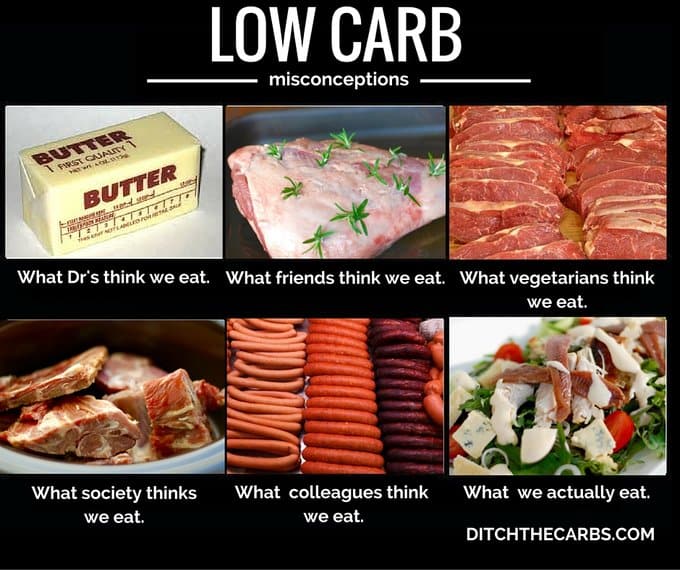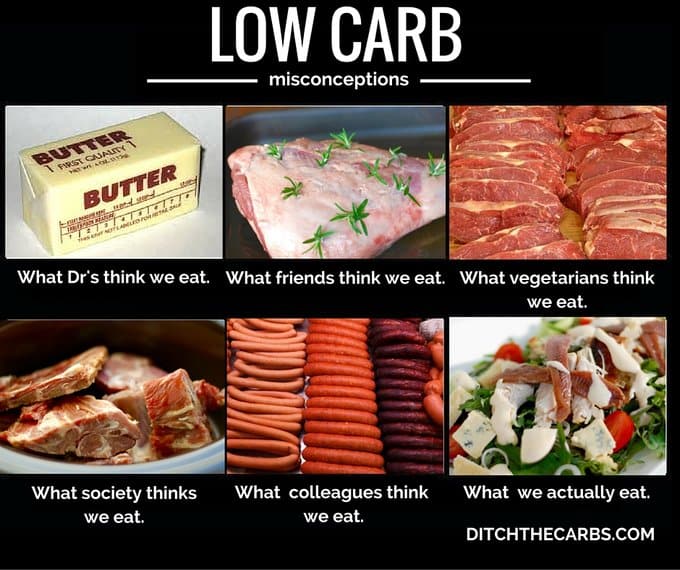The top 11 low carb myths, I bet you’ve heard them already – it’s dangerous, it’s unhealthy, it’s unsustainable, it’s restrictive, there’s no evidence – well let me explain why all those low carb myths are unfounded, and in fact, I can show you how each of the low carb myths can be counter-argued.

Generally low carb myths are being circulated by those who may not have researched low carb and make assumptions, or by those who haven’t caught up with the science. Studies continue to support the fact that low carb is an excellent choice for weight loss, heart health, diabetes (T1 and T2), nutrition, gut health, mental clarity and more information is coming to light regarding the ketogenic diet in the role of adjunctive cancer therapy.
- We eat no carbs and we restrict fruit and vegetables – firstly we are low carb not no carb and secondly there are no essential carbohydrates known. We have essential fatty acids and essential proteins, but there is no such thing as an essential carbohydrate. We eat fruit, but we choose nutrient dense fruit such as berries, but stay away from high sugar tropical fruits such as mango, bananas and pineapple. When we do eat carbs, it is from nutrient dense lower carb vegetables, nuts, berries and dairy. Our vegetable intake for most people actually increases. We remove the processed carbs from our diet and replace them with more vegetables. We no longer use carbs such as rice, pasta and bread to bulk up our meals, we use vegetables.
- We eat far too much meat and protein – sorry, another myth. We eat moderate protein. Too much protein is converted into glucose in the body via gluconeogenesis. We also advocate to eat meat that has had minimal intervention such as steaks, roasts, drumsticks, organ meats. There is a vast difference between processed meat such as hotdogs and burgers to meat such as steak, roasts, chops and ham on the bone. Protein is required for essential amino acids.
- Our diet isn’t varied – We eat a full variety of whole foods. When you take out the carbs what is left? Everything else. Take a look at the picture below. A high carb diet actually crowds out nutrition. A low carb diet crowds out junk. A sandwich has very little nutrition (with only a few scant nutritious ingredients inside) compared to a large salad. Having sushi for example, is the equivalent of eating white bread (in terms of carbs) and very little nutritious fillings inside. Take a look at this sushi autopsy. In fact when you go low carb, your diet will consist of meat, vegetables, fruit, nuts, seeds and healthy fats. Click on my recipe finder, you will see how varied our meals are. Many who have gone low carb say they have started cooking for themselves for the first time and love experimenting with new recipes and new foods.
- We are restricted to what we can eat – again another myth sorry. We restrict the products we eat. Do you know every year thousands of new products come into the marketplace. Do you also know that 85% of them have some form of added sugar? We eat a huge variety of foods, just not processed products. The problem in modern times is that so many products or fake foods contain sugars and grains, so it may appear that we are heavily restricted, but only because there are thousands of products available which we choose not to eat. By removing processed food, you almost become low carb by default.
- Low carb isn’t sustainable long term – myth again. Studies continually show that once people go low carb and give up sugars and grains, they do it for good. That is part of the success of such a way of eating as once you learn how damaging these are to our bodies and appetite, you actually don’t want to touch them again, rather than constantly fighting your will power. Maybe that’s why the sugar and grain industries are fighting back so vehemently. Once they lose a customer, they lose them for life.
- We are tired because we need carbs for energy – most people report that they have never had so much energy. Fat is a far more sustaining fuel than carbs. Once we use up all our stored carbs (glycogen) we switch to fat burning mode. We have an almost unlimited supply of energy in our fat stores. You will no longer be on the sugar roller coaster, with afternoon slumps and evening munchies.
- Low carb is another fad diet – humans have been eating low carb for thousands of generations, it is in fact our current high carb guidelines that should be seen as a fad diet. People tend to use the term ‘fad diet’ as a derogatory term when diets don’t work, but low carb works and it works long term. Entire populations thrive on low carb diets. The first book was published in 1862 by William Banting and Dr Harvey who prescribed weight loss by eating no bread, no pasta, no sugar, no beer, no starch – only meat, fish, and vegetables. Ask your grandparents what they did to lose a little weight – they stopped eating bread and potatoes.
- All that fat will give us heart disease – nope. Study after study has repeatedly shown us that it is the carbs in our diet that increases inflammation, creates the dangerous form of LDL cholesterol carrier (tiny, angry oxidised LDL), raised triglycerides, raises our risk of heart disease and Type 2 diabetes (which is one of the biggest risk factors of heart disease). Eating low carb and healthy fats actually reduces every single risk factor. Reducing your carbs will reduce your triglycerides (best predictor of heart disease), reduce blood pressure, improves HDL and improves the size and type of LDL. Read further on the cholesterol myth to really understand how important cholesterol is to us, and having a low level is just as much of a concern as having the wrong type.
- We don’t eat enough fibre – Hmm, all those leafy greens we’re getting isn’t enough? Nuts, seeds, coconut? But how much fibre is enough anyway? The myth of losing fibre from wholegrain bread is a persistent myth. Wholegrain bread is quite often processed then the fibre and grains added back in then fortified with vitamins. I’d rather get my fibre from whole foods with minimal human intervention.
- Ketosis is dangerous – firstly going low carb does not necessarily mean you will be in ketosis all the time, but actually most people frequently are anyway and they don’t realise it. Ever wonder how you survive your sleep and are not eating? Your body switches to fat burning once all it’s glycogen stores are used and will run quite happily on fat. Fat is released from your fat cells into your blood stream, these fatty acids are turned into ketones which fuel the body and brain. Ketosis is entirely different to ketoacidosis. Ketoacidosis is a condition that occurs in Type 1 diabetics where the level of ketones in the body cannot be controlled, it makes the blood acidic and can be fatal. See this infographic which illustrates the difference of ketosis vs ketoacidosis, then click here to be taken to an incredible article on ketosis.
- Our brain needs glucose as fuel – our brain can be fuelled by both glucose and ketones, which is how the human race has survived famines and periods of fasting since time immemorial. The brain can efficiently run on ketones, in fact this is what gives many people such mental clarity and continuous concentration that they have never experienced before when on a high carb diet. A ketogenic diet has an anti seizure effect for those with epilepsy. Ketosis is also a better environment for neuronal recover and repair, reduction of seizures and prevention of Alzheimer’s. If any glucose is required by certain parts of the brain, our bodies can produce it from protein through gluconeogenesis. So it appears that glucose is not the preferred fuel for the brain at all.
So is low carb is dangerous? – By reading all the low carb myths and research that counter-argues them, hopefully I have managed to put some uncertainty at rest. Why do others claim low carb is dangerous? The above myths just aren’t true. What is dangerous however, is eating processed food, and the incredible high carb diet which the majority eat, leading to obesity, heart disease, insulin resistance, Alzheimer’s and if that hasn’t convinced you, here’s another 30 reasons why sugar and carbs are bad for us.
Low carb improves our health in almost every way – weight loss, reduces hunger, improves metabolic syndrome, improves blood lipid profiles, reduces risk of heart disease, reduces blood pressure, improves insulin sensitivity and improves glycemic control, reduces triglycerides, reduces risk of T2 diabetes, cancer, Alzheimer’s, and low carb diets are easier to adhere to versus low fat diets. Reducing our carb intake and preventing insulin resistance can be one of the most powerful things we can do to live a long and healthy life.
Below, the Diet Doctor shows how those on a low carb diet may chose to eat 30g carbs compared to those who eat a standard diet. Remember, we are low carb NOT no carb. Spend your carbs wisely.

Below is what many consider to be a ‘healthy’ diet. Now you tell me if eating all of these sugars and carbs is good for our health?

More articles you may like –
OnKeto.com is a news aggregation service that brings you best of world articles to you for your consumption.
Author: None
Author URL: None
Original Article Location: https://www.ditchthecarbs.com/top-11-low-carb-myths/
